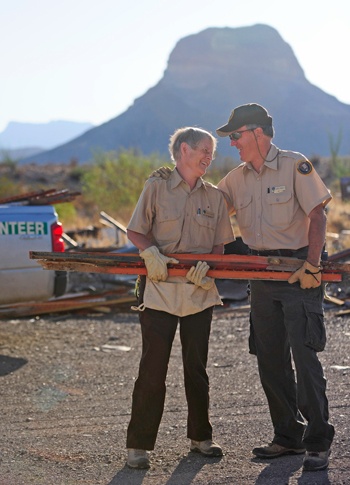Recreation managers have become increasingly dependent on a network of roaming volunteers, partly because of spending cuts and partly because remaining staff members are stretched thin.
In Texas, in the fiscal year ending September 30, 2011, resident volunteers provided 266,707 hours of service at approximately 80 state parks, natural areas and historic sites overseen by the Texas Parks and Wildlife Department. That’s the equivalent of 127 full-time employees, says Lori Reiley, statewide volunteer coordinator for TPWD. This saved the parks department $4.8 million in avoided costs for maintenance and administrative and other duties.
In February, TPWD rolled out a new avenue for potential volunteers: a website at which they can apply for work at Texas’ 95 state parks or other TPWD-operated facilities, such as fisheries and wildlife management areas or other outreach opportunities. Online applicants may specify desired locations and types of work.
Opportunities for park volunteers vary widely. Recently, a search of www.volunteer.gov (a site maintained by the Federal Interagency Team on Volunteerism) turned up 54 posts at recreational sites in Texas for three federal agencies: the U.S. Fish and Wildlife Service, the Army Corps of Engineers and the National Park Service. These one- to eight-month-long gigs include leading ocean-kayaking trips at Laguna Madre’s Laguna Atascosa National Wildlife Refuge; teaching schoolchildren about the natural world at the Santa Ana National Wildlife Refuge; and serving as a park interpreter at Guadalupe Mountains National Park. Other jobs are more mundane: The campground job at Lake O’ the Pines in East Texas consists primarily of cleaning restrooms and mowing grass.
To attract volunteers, some parks have begun to offer more amenities. In addition to waiving park entrance fees and providing free electricity, water and sewer, this may include free laundry facilities and recreational rooms for use by hosts.
One volunteer host at Palo Duro Canyon State Park in the Panhandle said he only chooses to go to locations that at least offer full hookups with onsite sewage disposal. “I don’t want to have to haul my waste to a dump station,” the man told Reiley.
“It’s being competitive,” Reiley explains about the need to offer more facilities for hosts.
That would seem to put some natural areas, such as Bird Island Basin Campground at Padre Island National Seashore, at a disadvantage. The camp host site does not have hookups and requires volunteers to use RV generators for electricity and on-board tanks for water and sewage. RV dump and water filling stations are about four miles away. Hosts are reimbursed the cost of propane and fuel for use by their generator.
It is the “most challenging to fill of our volunteer positions due to the lack of hookups at that site,” says Suzy Murray, volunteer coordinator at Padre Island National Seashore. So far, she has been able to fill it with the likes of Leta and Gary Bird from Baxley, Georgia, who served as hosts at the campground for two spring months in both 2010 and 2011. As their surname suggests, the couple are avid birders, and they decided to take the position partly because it’s on a major “flyway.”
The Birds own a travel trailer set up for “boondocking,” meaning it’s equipped with a generator, batteries, propane tanks and enough water and waste tanks so they could go “off grid” and still have electricity, and water and bathroom facilities for extended periods. At Bird Island, they drank bottled water and filled their tanks and dumped every week or two. They showered and did their laundry in facilities provided elsewhere for hosts. Among the biggest inconveniences: the camp rule that forbade use of noisy generators after 10 p.m.
“By the middle of May, it gets miserably hot and humid, and you cannot run the generator at night, so no A/C and no sleep,” Leta Bird wrote in an email. Even so, mostly they were “comfortable and only miss the A/C occasionally.” They hope to return this spring.
——————–
Charles Boisseau is an Austin-based writer.

